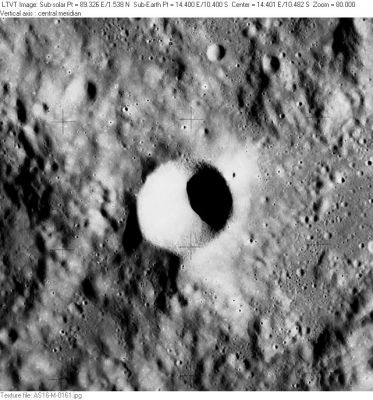Dollond
Contents
Dollond
|
Lat: 10.4°S, Long: 14.4°E, Diam: 11 km, Depth: 2.04 km, Rükl: 45 |
Images
LPOD Photo Gallery Lunar Orbiter Images Apollo Images
- Quite an amount of reflected light is noticeable on the shadowed inner slopes of satellite crater Dollond E, which is the northern one of the pair of bright bowl shaped craters in the curious high-albedo region east of Dollond itself, once called Caramuelis by Van Langren. The southern one of the pair is Descartes C. Perhaps the best orbital photograph to explore the shadowed eastern inner slopes and flat floor of Dollond E is the Arizona State University's zoomify scan of Apollo 16's southward looking mapping/metric Fairchild camera frame AS16-M-0701, in which Dollond E was captured near the frame's upper right corner. While exploring this photograph, please zoom in at maximum on Dollond E itself! The amount of detail on the shadowed slopes is remarkable!
- Research orbital Apollo 16 photography: Danny Caes.
Maps
(LAC zone 78D1) LAC map Geologic map LM map LTO map
Description
Description: Elger
(IAU Directions) DOLLOND.--A bright crater, about 6 miles in diameter, on the N.W. side of Descartes. Between it and the latter there is a rill-valley.
Description: Wikipedia
Additional Information
- Depth data from Kurt Fisher database
Pike, 1976: 2.04 km
Arthur, 1974: 1.58 km
Westfall, 2000: 2.04 km
Viscardy, 1985: 1.58 km - The shadows in AS16-M-0161 suggest a crater depth of about 1,500 m (but they may not reach to the deepest part of the floor). - Jim Mosher
- Satellite craters Dollond E, M, Ma and Mb are on the ALPO list of bright ray craters.
Ruins of a very ancient large crater north-northeast of Dollond
- North-northeast of Dollond (and north of Descartes) there seems to be a circle-shaped arrangement of elevations that looks more-or-less like the ruins of a large crater the size of Hipparchus. This circle-shaped tendency is depicted on SLC map C5 (System of Lunar Craters, 1966). How much of this ancient crater could be observed during low-sun circumstances? - DannyCaes Jan 21, 2017
Nomenclature
- Named for John Dollond (June 10, 1706 - November 30, 1761) , a British optician. In 1752 he abandoned his father’s trade of silk-weaving and joined his eldest son, Peter Dollond (1730-1820), who in 1750 had started in business as a maker of optical instruments. His reputation grew rapidly, and in 1761 he was appointed optician to the king. In 1758 he published an "Account of some experiments concerning the different refrangibility of light" (Phil. Trans., 1758), describing the experiments that led him to the achievement with which his name is specially associated, the discovery of a means of constructing achromatic lenses by the combination of crown and flint glasses. Early in 1757 he succeeded in producing refraction without colour by the aid of glass and water lenses, and a few months later he made a successful attempt to get the same result by a combination of glasses of different qualities (see History of telescopes).
- This name was one of eight names introduced by Lohrmann (Whitaker, p. 119). All of Lohrmann's names were adopted by the three "authorities" cited in Mary Blagg's Collated List, and incorporated into the original IAU nomenclature of Blagg and Müller (1935).
- Dollond B was called Barcroft by Wilkins and Moore, but the I.A.U. did not accept that name. Barcroft (David P.Barcroft) is known for his active role in the ALPO.
LPOD Articles
Bibliography
